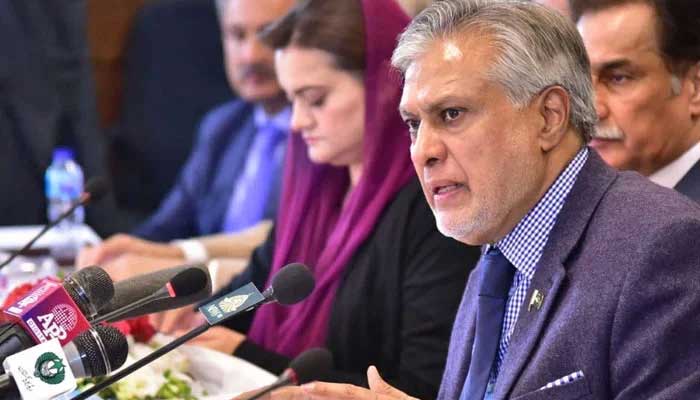- “Pakistan has already completed all conditions of IMF,” Ishaq Dar says.
- FinMin says some powers do not want economic stability in Pakistan.
- Financial czar slams Imran Khan-led govt for violating pact with IMF.
Finance Minister Ishaq Dar has revealed that the coalition government has agreed to share details of its upcoming budget details with the International Monetary Fund (IMF) in order to unlock the stalled funds.
“They have asked us for some more details like the details of (the) budget, we will give that to them,” Dar said while speaking on Geo News programme Jirga on Sunday.
He reiterated that the country has fulfilled all conditions laid forth by the Washington-based lender to revive the stalled $6.5 billion programme and urged the global lender to release the funds before the upcoming federal budget due next month.
The financial czar said some powers do not want economic stability in Pakistan and blamed the previous Pakistan Tehreek-e-Insaf (PTI) government for “destroying” the country’s economy.
“Record inflation was witnessed during Imran Khan’s tenure,” he said, adding that the former prime minister did not honour the agreement with the IMF.
The IMF’s $1.1 billion funding to Pakistan, which is part of the $6.5 billion rescue package agreed in 2019, has been held up since November.
The IMF and Pakistan held two weeks of talks in February in Islamabad to conclude the 9th review, but the lender has not yet released the money, which is critical for the country to unlock other bilateral and multilateral financings.
The federal minister further said that he would want the IMF to release the funds before the budget was presented, which is due in early June. He added, “We will not do the 9th and 10 reviews together. This is unfair.”
Pakistan is making last-ditch efforts with the IMF to revive the stalled Extended Fund Facility (EFF) programme, The News reported earlier this month.
The hopes are diminishing each day mainly because the ongoing programme of $6.5 billion under the EFF will expire on June 30.
The parleys between Pakistan and the IMF continue for the completion of the ninth review, which was due on November 3 of last year. The formal negotiations started on January 31 when an IMF delegation visited Pakistan for in-person talks.
However, the two sides could not reach a consensus during the course of scheduled talks that ended on February 9. Since then, multiple online sessions have been held but the differences persist on conditions set by the Fund for the Staff Level Agreement (SLA).
If the SLA is not struck ahead of the upcoming budget for 2023-24, scheduled to be unveiled on June 9, the ongoing programme will face a failure.
“There are a couple of options left for moving forward. The first is by signing the SLA on an immediate basis and forwarding Pakistan’s request before the IMF Executive Board for approving the next tranche of $1 billion and also securing an extension in the EFF programme period by a few months in order to accomplish the 10th and 11th Reviews,” sources, privy to the background discussions told the publication.
The second option could be combining the 9th and 10th reviews and for Pakistan to share upcoming budgetary numbers with the IMF.
Then the SLA should be signed after the announcement of the budget and in case of its approval from parliament, the IMF’s Executive Board could approve combined tranches and also grant an extension to the EFF programme for accomplishing the 11th Review by July or August 2023.
“There are no easy options available; both sides will have to work out modalities for evolving consensus. But with the existing approach of maintaining the status quo, no breakthrough can be achieved,” said the official who spoke on the condition of anonymity.

 Latest News2 days ago
Latest News2 days ago
 Business2 days ago
Business2 days ago
 Latest News2 days ago
Latest News2 days ago
 Latest News2 days ago
Latest News2 days ago
 Entertainment2 days ago
Entertainment2 days ago
 Latest News2 days ago
Latest News2 days ago
 Latest News2 days ago
Latest News2 days ago
 Latest News1 day ago
Latest News1 day ago






















